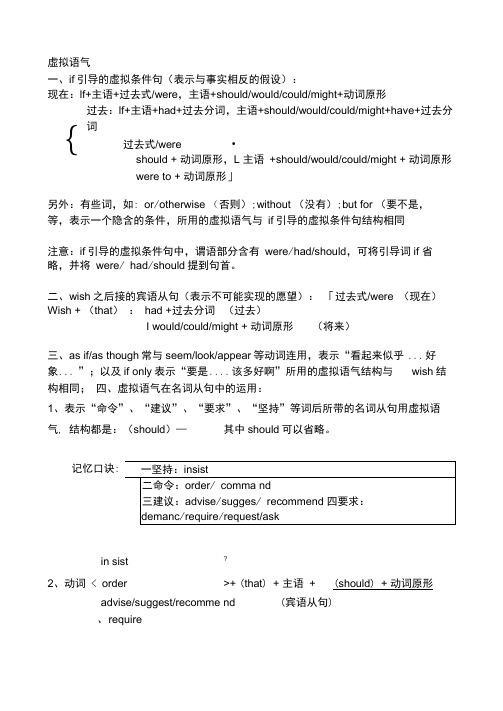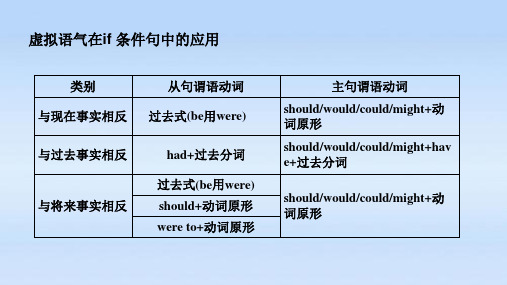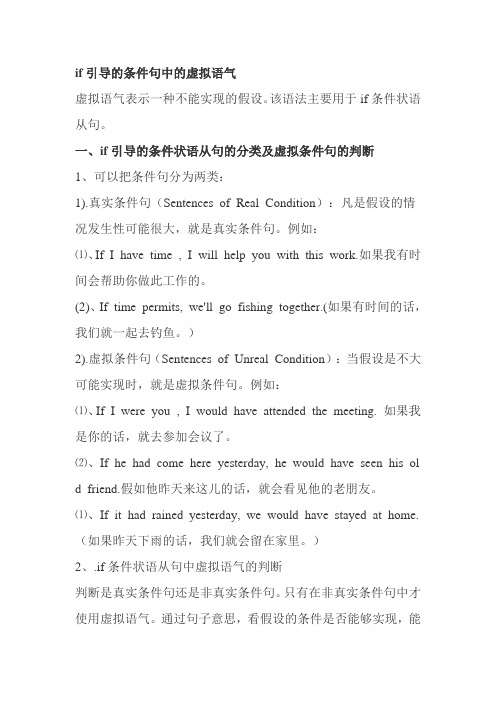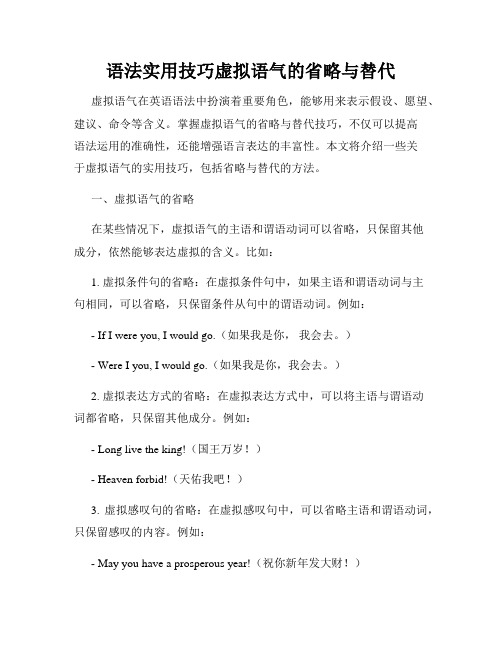虚拟条件句中if的隐含或省略
虚拟语气句型

虚拟语气一、if 引导的虚拟条件句(表示与事实相反的假设):现在:lf+主语+过去式/were ,主语+should/would/could/might+动词原形过去:lf+主语+had+过去分词,主语+should/would/could/might+have+过去分词过去式/were • should + 动词原形,L 主语 +should/would/could/might + 动词原形were to + 动词原形」另外:有些词,如: or /otherwise (否则);without (没有);but for (要不是, 等,表示一个隐含的条件,所用的虚拟语气与 if 引导的虚拟条件句结构相同注意:if 引导的虚拟条件句中,谓语部分含有 were /had/should ,可将引导词if 省略,并将 were / had /should 提到句首。
二、wish 之后接的宾语从句(表示不可能实现的愿望): 「过去式/were (现在) Wish + (that ) : had +过去分词 (过去)I would/could/might + 动词原形 (将来)三、as if/as though 常与seem/look/appear 等动词连用,表示“看起来似乎 ... 好 象 ... ”;以及if only 表示“要是 .... 该多好啊”所用的虚拟语气结构与 wish 结 构相同; 四、虚拟语气在名词从句中的运用:1、表示“命令”、“建议”、“要求”、“坚持”等词后所带的名词从句用虚拟语气, 结构都是:(should )— 其中should 可以省略。
in sist? 2、动词 < order >+ (that ) + 主语 +(should ) + 动词原形 advise/suggest/recomme nd (宾语从句)、require{记忆口诀3、名词:advice/suggestion/order /request之后接表语从句或同位语从句,谓语部分也是用(should)+动词原形4、在主语从句中:It is suggested/required/ordered/ • that + 主语+ (should) + 动词原形It is importa nt/stra nge/necessary/• that + 主语+ (should) + 动词原形:过去式(现在/将来)五、would rather + sb. + €♦had +过去分词(过去)六、It is (high) time that + 主语+ 过去式【本文档内容可以自由复制内容或自由编辑修改内容期待你的好评和关注,我们将会做得更好】。
虚拟语气在条件状语从句中的用法(if条件句)

在写作中的应用
创作文学作品中
在创作小说、诗歌等文学作品时, 虚拟语气可以用来表达虚构的情 节和角色情感,增强作品的情感
色彩和艺术效果。
撰写学术论文
在撰写学术论文时,使用虚拟语 气可以表达假设的情景或条件, 例如在讨论不同政策或方案的影
响时。
写邮件和信件
在写邮件或信件时,使用虚拟语 气可以表达礼貌和尊重,例如在
在撰写商务广告和宣传材料时,使用虚拟语气可以增强语 言的感染力和说服力,例如“假如您正在寻找更好的产品 ,那么您来对了地方。”
感谢您的观看
THANKS
if条件句中的虚拟语气与时间状语从句的时态不一致
总结词
当if条件句中的虚拟语气与时间状语从句的时态不一致 时,通常是为了强调或表达与时间状语从句相反的情 况。
详细描述
在英语语法中,当if条件句中的虚拟语气与时间状语从 句的时态不一致时,通常是为了强调或表达与时间状语 从句相反的情况。这种用法能够使句子更加生动和富有 表现力,突出说话者对某个特定时间点的态度或情感。 例如,在句子"If I had known the answer yesterday, I would have told you."中,虚拟语气"had known" 与时间状语从句的时态"yesterday"不一致,强调了说 话者对过去的遗憾或后悔。
虚拟语气在条件状语从 句中的用法(if条件句)
目录
CONTENTS
• 虚拟语气在条件状语从句中的基本结构 • 虚拟语气在条件状语从句中的用法 • 虚拟语气在条件状语从句中的特殊情况 • 虚拟语气在条件状语从句中的实际应用
01 虚拟语气在条件状语从句 中的基本结构
虚拟语气在if 条件句中的应用

4. pull oneself together
pull up
Hale Waihona Puke 停车cheer up 振作起来
5.be accustomed to doing sth.
6.bittersweet
苦乐参半
=be used to doing sth.
7.exceptional adj. 优秀的;杰出的
8. author
v. 编写;写作;著作 n. 作者;作家
author a book
9.coachable
可培训的/可教的
a coachable skill
10.step in step out step aside
介入;插手;干预 退出;离开 站到一旁/ 让路;让地位(工作)
11.make room for 给... 空出场所;让路;让座
一个旅游景点
optional adj.
可选择的
option n. 选择
pay in cash/ by check 用现金/ 支票付款
3. cover
v.覆盖 cover... with ... be covered with... 报道 走了...路程 支付 包含
n. 覆盖物; (书刊的) 封面,封皮;
催促/ 驱使/ 强迫某人做...
drive sb. to do sth.
15. net income
净收入
16. fuel
n.燃料; v.给…提供燃料; 给...加油; 增加; 加强; 刺激
fuel your inspiration
17. what if....? 如果...会怎么样?
18. regardless of 不管;不顾
(完整版)if引导的条件句中的虚拟语气

if引导的条件句中的虚拟语气虚拟语气表示一种不能实现的假设。
该语法主要用于if条件状语从句。
一、if引导的条件状语从句的分类及虚拟条件句的判断1、可以把条件句分为两类:1).真实条件句(Sentences of Real Condition):凡是假设的情况发生性可能很大,就是真实条件句。
例如:⑴、If I have time , I will help you with this work.如果我有时间会帮助你做此工作的。
(2)、If time permits, we'll go fishing together.(如果有时间的话,我们就一起去钓鱼。
)2).虚拟条件句(Sentences of Unreal Condition):当假设是不大可能实现时,就是虚拟条件句。
例如:⑴、If I were you , I would have attended the meeting. 如果我是你的话,就去参加会议了。
⑵、If he had come here yesterday, he would have seen his old friend.假如他昨天来这儿的话,就会看见他的老朋友。
⑴、If it had rained yesterday, we would have stayed at home.(如果昨天下雨的话,我们就会留在家里。
)2、.if条件状语从句中虚拟语气的判断判断是真实条件句还是非真实条件句。
只有在非真实条件句中才使用虚拟语气。
通过句子意思,看假设的条件是否能够实现,能够实现是真实条件句,不能使用虚拟语气;假设的条件不能实现则是非真实条件句,要用虚拟语气。
判断这个假设是与哪个事实相反。
通常有三种情况:①与过去事实相反。
②与现在事实相反。
③与将来事实可能相反。
3、“后退一步法”后退一步法是指在准确地判断了该句与哪一事实相反后,按虚拟语气的后退一步法处理从句谓语动词的时态。
虚拟语气汇总

The Subjunctive Mood1,含if 的虚拟条件句She would have come, if she had not been so busy.If he had been here, he might have been able to help you.If I were you, I would consider their proposal.How nice it would be, if you could stay a bit longer.If I were to do it, I would do it in a different way.*if 条件句中含were, had, should时,有时可省略if,将were, had, should移置主语前.Had he come a little earlier, I might have met him.Were he to leave tomorrow, I would go with him.Were there no gravity, there would be no air around the earth.2, suppose/supposing 相当于 what if ,可以引出虚拟条件句Suppose I accepted this offer, what wouldyou say?Supposing the train were late, what should we do?3, 含蓄虚拟标志词:but that, but for, without, in the absence of, otherwise,I would have written the paper before, but that I have been ill.But that he saw it, he would not have believed it.But that he helps, I should fail.But for the rain, we would have had a pleasant journey.Without his aid, I could not have done it.In the absence of water, plants could not grow well.He was held up in the traffic; otherwise he would not have been late.4, 隐含在句子意义中的虚拟语气Born in better times, he would have done credit to the profession of letters.A more careful student would not have made such a mistake.In different circumstances, I could havesaid yes.Left to itself, the country would have achieved its unity.5, 表示建议,命令,请求等主观意愿的动词,后面的宾语从句要用虚拟语气(should do)suggest, propose, advise, recommend, move, vote(提议)order, command, instructdemand, request, require, ask, beg, urge (强烈要求),insist, maintain, desire, prefer, decide, determine, etc.e.g. I suggest that he should set offstraight away.6, 三种主语从句(should do)It is desired/ suggested/ requested/ ordered/ decided/ arranged/recommended, that sb. should do sth. It is a pity/ shame/ must that sb should do sthIt is strange/ appropriate/ desirable/ fitting/ impossible/ obligatory/proper/ necessary/ incredible/urgent/ possible/ essential/advisable明智的/ natural/ important/preferable/ ridiculous/ vital/insistent紧急的/ imperative紧急必要的/crucial/ critical/ best/ betterthat sb should do sth7,名词后接表语从句或者同位语从句(should do) suggestion, proposal, advice, recommendation, motion,order, command, instructiondemand, request, requirement, insistence,desire, preference, decision, resolution,idea, plan, word, necessity,He gave order that the test should be finished before ten.My suggestion is that we should start out at once.8, wish, imagine后面加上一些不可能实现的事情时,用虚拟语气Just imagine everyone were to give up smoking.I wish it were spring all the year round.9, 在lest, for fear that, in case状语从句中用虚拟语气(should do )She obeyed her husband in everything lest he should be angry.10, It is high / about time that somebody did somethingIt is time that we left.11, if only 感叹句中用虚拟语气“但愿/要是就好了”If only I were not so nervous.12, 有时as if, as though从句中用虚拟语气He acted as if he were an expert.13, 有时though 让步状语从句中用虚拟语气Though the whole world were against me, I would do what I consider as right.14, S1 would rather that S2 (主句与从句的主语不一致时,从句中用虚拟语气)用一般过去时表示与现在事实相反的虚拟用过去完成时表示与过去事实相反的虚拟I would rather that you did nothing about it for the time being.He would rather that you hadn’t been so rude to her in the past.15, 表示祝愿、诅咒、禁止时用虚拟语气(用动词原形)L ong live the people’s republic of china.God bless you.God damn you.Heaven forbid.So be it.Home is home, be it ever so homely.。
语法实用技巧虚拟语气的省略与替代

语法实用技巧虚拟语气的省略与替代虚拟语气在英语语法中扮演着重要角色,能够用来表示假设、愿望、建议、命令等含义。
掌握虚拟语气的省略与替代技巧,不仅可以提高语法运用的准确性,还能增强语言表达的丰富性。
本文将介绍一些关于虚拟语气的实用技巧,包括省略与替代的方法。
一、虚拟语气的省略在某些情况下,虚拟语气的主语和谓语动词可以省略,只保留其他成分,依然能够表达虚拟的含义。
比如:1. 虚拟条件句的省略:在虚拟条件句中,如果主语和谓语动词与主句相同,可以省略,只保留条件从句中的谓语动词。
例如:- If I were you, I would go.(如果我是你,我会去。
)- Were I you, I would go.(如果我是你,我会去。
)2. 虚拟表达方式的省略:在虚拟表达方式中,可以将主语与谓语动词都省略,只保留其他成分。
例如:- Long live the king!(国王万岁!)- Heaven forbid!(天佑我吧!)3. 虚拟感叹句的省略:在虚拟感叹句中,可以省略主语和谓语动词,只保留感叹的内容。
例如:- May you have a prosperous year!(祝你新年发大财!)- May justice prevail!(愿正义得到伸张!)虚拟语气的省略技巧在写作和口语表达中非常实用,能够简化句子结构,使语言更加简洁明了。
二、虚拟语气的替代在虚拟语气中,有时可以使用其他措辞来表达相同的意思,从而增加语言的变化性和灵活性。
下面是一些常见的虚拟语气的替代方式:1. 替代“wish”:在表达遗憾或愿望时,可以使用“if only”或“should have done”来替代“wish”。
例如:- I wish I had studied harder.(我希望我学得更努力。
)- If only I had studied harder.(要是我学得更努力就好了。
)- I wish I could go with you.(我希望我能跟你一起去。
虚拟语气在条件状语从句中的用法(if条件句)
条件从句 If 从句的谓语形式 主句的谓语形式
现在
did / were
would/could/should/ might +V.(原)
过去
had done
would/could/should/ might+have+p.p.
未来
1. did / were 2. should do
would/could/should/ might + V.(原)
Because She was an inventor and a scientist .
Because She was given the
Nobel Prize for Chemistry in
1911 .
Because She is the only woman
scientist who was awarded Nobel Prize for two times
4.without和but for 构成含蓄虚拟。(but for要 不是)
• Without sunlight, people’s life would be different from today.
• But for your help, I wouldn’t have finished the work.
• Without your help, I would have failed.
• But for water, it would be impossible to live in the desert.
Match the sentences :
•11.If you saw a person four metres high, •22.If Rob hadn’t injured himself, •33.If I were you, •44.If she had studied harder, •55.If you wrote me beautiful poems every day
关于英语中虚拟语气的用法介绍
If you had taken my advice, you wouldn’t(couldn’t) have failed in the exam.如 果你听了我的建议,你就不会考试不及格。(事实上你根本没听我的。)
3 表示与将来事实可能相反的假设和结果。如: If it should rain, the crops would(could, might)be saved.假如天下雨,庄稼可能就
4.用于特定词语后的宾、主、表及同位语从句中 虚拟语气用于表示要求、建议、命令等意义的动词、名词及形容词后的宾语从句、 主语从句、表语从句及同位语从句中。其形式都是“sould+动词原形”,should 可省略。
1)用于宾语从句中 常用的动词: ask,advise,command,decide,demand,insist,order,propose,request,require ,suggest 等。 He insisted that we all(should) be in his office at six. The doctor suggested that she (should) take a trip. 2)用于主语从句中 常用的结构:It is+形容词或过去分词+主语从句(用虚拟语气) 常见的形容词或分词: essential,urgent,necessary,important,advisable,natural,desired,demand ed,ordered,required,suggested 等。 It is necessary that this machine(should) be oiled every day. It is required that the machine be tested. 3)用于表语从句或同位语从句中 常用的名词: advice,command,demand,desire,idea,order,proposal,request requirement 等。 His suggestion is that we go out on a picnic next Sunday.(表语从句) His suggestion that we go out on a picnic next Sunday is wonderful.( 同位语从句)
if 条件状语从句中的虚拟语气
1.if 条件状语从句中的虚拟语气一、if 条件状语从句中表示对将来、过去、现在的虚拟1. If she invites me tomorrow, I shall go to the party.(真实条件句)如果她明天邀请我参加聚会,我就去.If she invited me , I should go to the party.[虚拟条件句] (说话人认为邀请的可能性较小或不可能)She will probably not invite me, so I shall not go to the party.2. If she had invited me yesterday, I should have gone to the party.假如她昨天邀请我参加聚会,我就去了.She didn`t invite me yesterday, so I didn`t go to the party. 她昨天没有邀请我参加聚会,因此我没有去.3. If she should invite me tomorrow, I should go to the party.If she were to invite me tomorrow, I should go to the party.If she invited me tomorrow, I should go to the party.1.对现在的虚拟条件状语从句的动词形式主句的动词形式If+主语+动词过去式(be的过去式用were) I (we) should+动词原形主语+would(might, could)+动词原形If I were you, I should study English. (I am not you , so I shall not study English.)If I had time, I would attend the wedding. (I does not have time, so I will not attend the wedding.)If they didn`t take physical exercises every day, they wouldn`t be so healthy.(They take physical exercises every day, so they are very healthy.)2.对过去的虚拟条件状语从句的动词形式主句的动词形式If+主语+had+过去分词 I(we) should+ have+过去分词主语+would(might, could)+have+过去分词If you had taken my advice, you wouldn`t have failed in theexamination.(You did not take my advice, so you have failed in the examination.)3.对将来的虚拟条件状语从句的动词形式(三种) 主句的动词形式⑴If+主语+动词过去式(be的过去式用were),通常要与一个表示将来的时间状语连用(tomorrow)⑵If+主语(任何人称和数)+should+动词原形⑶If+主语(任何人称和数) +were +to动词原形I (we) should+动词原形或主语(任何人称)+would(might, could)+动词原形If it rained tomorrow, our picnic would be put off.If it should rain tomorrow, our picnic would be put off. If it were to rain tomorrow, our picnic would be put off.。
虚拟语气在 if 条件句中的用法
_______five minutes earlier, you could have seen them off. A. If you should arrive B. If you arrive C. Had you arrived D. Should you arrive
________it rain tomorrow, we should put off the visit to the Science Museum. A. could B. should C. would D. might
Little Robert asked his mother for two cents. "What did you do with the money I gave you yesterday?", Mother asked. "I gave it to a poor old woman," he answered. "You're a good boy," said the mother proudly. "Here are two cents more. But why are you so interested in the old woman?" “If she had not been the one who sold the candy, I would not have given her my money and I would not be so interested in her.” he answered. What can we know from this passage? A. Robert paid the old woman for the candy. B. Robert was a good boy. C. The old woman gave Robert the candy for free. D. The old woman didn’t sell the candy.
- 1、下载文档前请自行甄别文档内容的完整性,平台不提供额外的编辑、内容补充、找答案等附加服务。
- 2、"仅部分预览"的文档,不可在线预览部分如存在完整性等问题,可反馈申请退款(可完整预览的文档不适用该条件!)。
- 3、如文档侵犯您的权益,请联系客服反馈,我们会尽快为您处理(人工客服工作时间:9:00-18:30)。
虚拟条件句中if的隐含或省略
语言是灵活多变的,表达是丰富多彩的。
有的时候虚拟语气的表现形式也显得非常灵活,比如就说其中的虚拟条件吧——它有时会以if从句来表示,但有时会用某种短语来表示,比如不定式短语、分词短语、介词短语等等。
1. if的隐含
I should be happy to go with you.如果能与你一起去,我将很高兴。
句中的不定式短语to go with you就是表示虚拟条件的,它相当于if I could go with you。
这句话的言外之意是:可惜我不一定有机会同你一起去。
To have studied harder, you would have passed the examination.你学习更用功些,你早就考及格了。
句中的不定式短语to have studied harder也是表示虚拟条件的,它相当于if you had studied harder。
句子的言外之意是:可惜你当时没有更用功我,所以你就没有考及格。
Failing this time, what would you do?假若这次失败,那你怎么办?
句中的分词短语failing this time表示虚拟条件,相当于if you failed this time。
其言外之意是:尽管失败的可能性很小,但还是有可能会失败,假若失败了,那怎么办?
Without your help, we couldn’t have succeeded.如果没有你的帮助,我们就不会取得成功。
句中的介词短语without your help表示虚拟条件,相当于if you hadn’t given us help。
其言外之意是:好在你帮助了我们,所以我们取得了成功。
I didn’t know that he was a cheat, or else I wouldn’t have believed him.我不知道他是个骗子,不然我也不会相信他了。
句中的or else隐含着一个虚拟条件,它相当于if I had known he was a cheat。
句子的言外之意是:当是我竟然相信了他。
2. if的省略
在虚拟条件句中,有时可将引民虚拟条件句的连词if省略,但此时应用倒装句型,即将从句中的were, should, had等提到句首。
如:
如果她在这里,她也同意的。
If he were here, she would agree too.
→Were she here, she would agree too.
假若明天下雨,我们只好推迟这场比赛。
If it should rain tomorrow, we should have to put off the match.
→Should it r ain tomorrow, we should have to put off the match.
要是我们当时早点找到他的话,我们就可以救活他。
If we had found him earlier we could have saved his life.
→Had we found him earlier we could have saved his life.
注意,如果条件从句的谓语为否定式,其中的否定词not应置于主语之后,而不能与were, should, had等缩略成Weren’t, Shouldn’t, Hadn’t而置于句首。
我如不是警告了你,你就可能丧命了。
正:If I hadn’t warned you, you could have been killed.
正:Had I not warned you, you could have been killed.
误:Hadn’t I warned you, you could have been killed.
另外,有时省略if后提前到句首的had可能不是助动词,而是实义动词。
如:
Had I time, I would go with you.假如我有时间,我就同你们一起去。
句中的had不是构成过去完成时的助动词,而是表示“有”,如果不省略if,其完整形式为:If I had time, I would go with you.。
